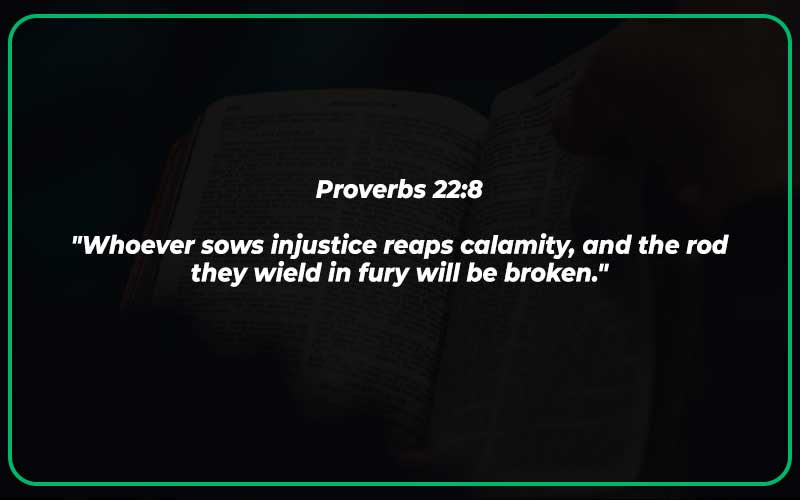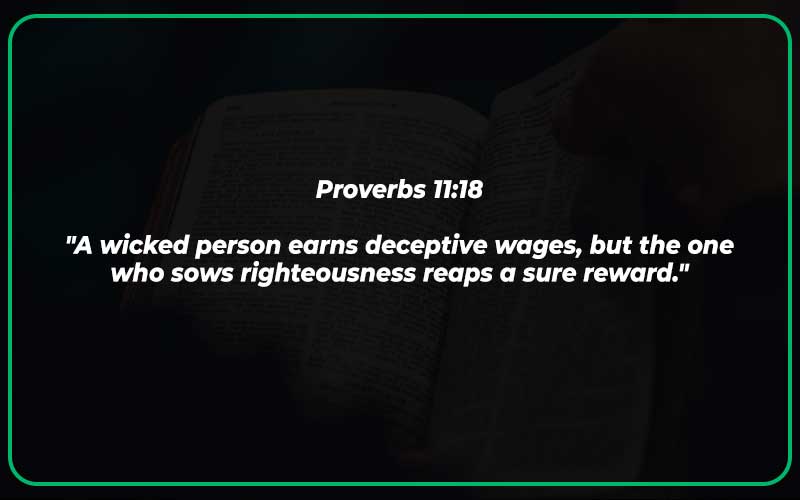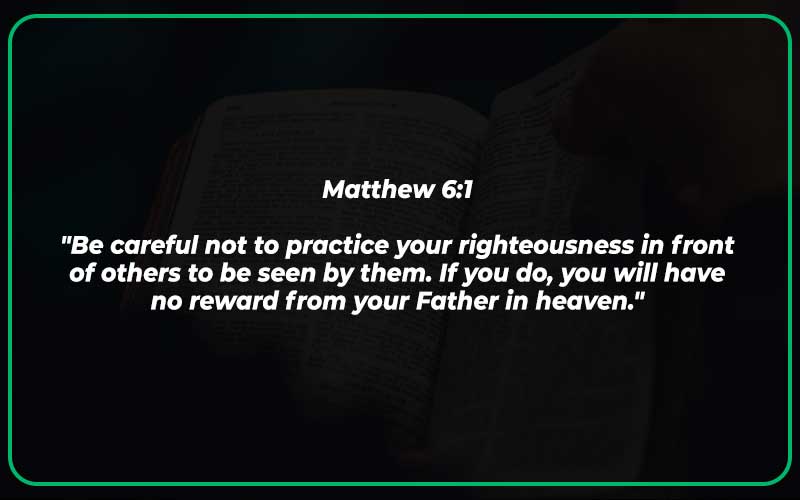Are you familiar with the saying, “You reap what you sow”? It’s a profound concept that holds true in various aspects of life, from relationships to career choices. And where better to find guidance and wisdom on this topic than the Bible?
The Bible is filled with verses that delve into the idea of reaping the consequences of our actions. Whether you’re seeking encouragement, warnings, or spiritual insights, these verses offer a powerful reminder of the importance of our choices.
In this blog post, we’ll explore some of the most impactful Bible verses about reaping what you sow. So, if you’ve ever wondered about the consequences of your choices or yearned for a deeper understanding of cause and effect, join us on this insightful journey through Scripture.
Let’s dive in and discover the profound wisdom that the Bible has to offer on reaping what you sow.
Also Read: Top 25 Bible Verses About Mom’s Love (With Commentary)
Bible Verses About Reaping What You Sow
Galatians 6:7
“Do not be deceived: God cannot be mocked. A man reaps what he sows.”
This verse reminds us that our actions have consequences. If we sow good seeds, we will reap blessings, but if we sow evil seeds, we will reap destruction. God, in His justice, ensures that what we sow will be what we ultimately harvest. This verse also warns us against trying to deceive or mock God, as He sees our true intentions and will not be fooled.
Job 4:8
“As I have observed, those who plow evil and those who sow trouble reap it.”
This verse from the book of Job reflects the wisdom of Eliphaz, who speaks about the principle of sowing and reaping. It teaches us that those who sow evil actions and trouble will inevitably reap the consequences of their actions. This serves as a reminder to choose our actions wisely and to consider the consequences of our choices before we act.
Proverbs 22:8
“Whoever sows injustice reaps calamity, and the rod they wield in fury will be broken.”
This proverb illustrates the consequences of sowing injustice and harm towards others. It emphasizes that selfish acts of injustice will ultimately lead to calamity and destruction in one’s life. Furthermore, it suggests that those who wield cruelty and anger as a means of control will ultimately find themselves broken by their own actions. This verse serves as a reminder to treat others with fairness and kindness, knowing that our actions will have an impact on our own lives.

Hosea 8:7
“They sow the wind and reap the whirlwind. The stalk has no head; it will produce no flour. Were it to yield grain, foreigners would swallow it up.”
This verse from the book of Hosea speaks of the consequences of Israel’s disobedience to God. Their actions are described as sowing the wind, resulting in reaping the whirlwind, symbolizing the destructive consequences of their behavior. This verse serves as a warning about the dangers of sowing disobedience and rebellion against God, for it leads to devastation and loss. It reminds us to align our actions with God’s will to avoid destructive consequences.
Proverbs 26:27
“Whoever digs a pit will fall into it; if someone rolls a stone, it will roll back on them.”
This proverb teaches the principle of reaping what you sow in the form of consequences that come back upon ourselves. It emphasizes the idea that evil actions will ultimately result in harm befalling the one who initiated them. It encourages us to consider the repercussions of our actions, knowing that what we do will come back to affect our lives in one way or another.
Psalm 126:5-6
“Those who sow with tears will reap with songs of joy. Those who go out weeping, carrying seed to sow, will return with songs of joy, carrying sheaves with them.”
These verses from Psalm 126 depict the imagery of sowing seeds in tears and reaping with joy. It speaks of the hardships and sorrows that may accompany our acts of sowing, but it assures us that these will ultimately be transformed into joy and abundance. This passage serves as a reminder that even in difficult times, our faithfulness and perseverance will be rewarded with blessings and celebration.
Proverbs 14:14
“The faithless will be fully repaid for their ways, and the good rewarded for theirs.”
This proverb highlights the surety of reaping what we sow. It assures that those who act in faithlessness and unrighteousness will receive the consequences of their actions, while the good and righteous will be rewarded. It instills the principle of divine justice, reminding us that our actions have eternal implications and that God’s judgment is fair and impartial. This verse encourages us to live in righteousness and have faith in God’s promise of rewards for the faithful.
Isaiah 3:10-11
“Tell the righteous it will be well with them, for they will enjoy the fruit of their deeds. Woe to the wicked! Disaster is upon them! They will be paid back for what their hands have done.”
Isaiah proclaims a message of hope to the righteous, assuring them that their deeds will bear fruits of blessings and well-being. Conversely, the wicked are warned of the impending consequences of their evil actions. This passage reinforces the principle of reaping what one sows and emphasizes that God’s justice will prevail. It implores us to seek righteousness and warns of the dire consequences of wickedness and rebellion against God.
Proverbs 11:18
“A wicked person earns deceptive wages, but the one who sows righteousness reaps a sure reward.”
This proverb emphasizes the contrast between the wicked and the righteous. It suggests that wickedness may yield temporary gains that are ultimately deceptive and unsatisfying. On the other hand, sowing righteousness assures a sure reward that is lasting and fulfilling. This verse encourages us to pursue a life of righteousness, understanding that the rewards of righteousness far outweigh any temporary benefits that wickedness may offer.

Psalm 37:25
“I was young and now I am old, yet I have never seen the righteous forsaken or their children begging bread.”
In this psalm, David reflects on his experience and testifies to God’s faithfulness in providing for the righteous. It speaks to the assurance that those who live in righteousness will never be abandoned or left in need. This verse offers comfort and encouragement to believers, assuring them that God will always provide for their needs. It reinforces the principle that even in the face of challenges and difficulties, the righteous will ultimately reap the rewards of God’s provision.
Proverbs 24:12
“If you say, ‘But we knew nothing about this,’ does not he who weighs the heart perceive it? Does not he who guards your life know it? Will he not repay everyone according to what they have done?”
This verse highlights the futility of ignorance as an excuse for wrongdoing. It makes clear that God, who weighs the heart and knows all things, will hold every person accountable for their actions. It underscores the principle of divine justice, assuring that God will repay each person according to their deeds. This verse reminds us that our actions matter and that we will ultimately face the consequences of our choices, whether we acknowledge them or not.
Proverbs 10:16
“The wages of the righteous is life, but the earnings of the wicked are sin and death.”
This proverb draws a stark contrast between the ultimate outcomes for the righteous and the wicked. It asserts that the wages of the righteous is life, implying eternal blessings and the favor of God. Conversely, the earnings of the wicked are sin and death, suggesting spiritual death and separation from God. This verse emphasizes the importance of living a righteous life, knowing that the rewards of righteousness lead to spiritual life and fellowship with God.
Matthew 7:2
“For in the same way you judge others, you will be judged, and with the measure you use, it will be measured to you.”
In this verse, Jesus teaches about the principle of reaping what you sow in the context of judgment. He warns against a judgmental attitude and reminds us that the measure we use to judge others will be applied to ourselves. This verse emphasizes the importance of showing mercy, grace, and forgiveness to others, knowing that we too will stand before God’s judgment. It encourages us to be mindful of our attitudes and actions, treating others with the same measure of compassion and love that we desire for ourselves.
Lamentations 3:39-40
“Why should the living complain when punished for their sins? Let us examine our ways and test them, and let us return to the Lord.”
These verses from the book of Lamentations confront the tendency to complain when facing the consequences of our sins. It encourages self-reflection and self-examination instead, urging us to turn back to the Lord. This passage reminds us that when we experience the consequences of our wrongdoings, it is an opportunity to evaluate our choices and realign ourselves with God’s will. It teaches humility and repentance as a means to receive God’s forgiveness and restoration.
Proverbs 19:17
“Whoever is kind to the poor lends to the Lord, and he will reward them for what they have done.”
This proverb emphasizes the principle of reaping what we sow in acts of kindness and generosity. It affirms that when we show kindness and help those in need, we are lending to the Lord Himself. It assures that God will reward us for the good deeds we have done. This verse encourages us to have a compassionate and generous heart, knowing that our actions towards others will be acknowledged and rewarded by our Heavenly Father.
Matthew 25:40
“The King will reply, ‘Truly I tell you, whatever you did for one of the least of these brothers and sisters of mine, you did for me.'”
This verse is part of Jesus’ teaching on the final judgment. It emphasizes the principle of reaping what we sow in our actions towards others, especially those in need. Jesus affirms that when we care for the least among us, we are ministering unto Him. It reminds us that our actions of love, kindness, and service will be rewarded by the King Himself. This verse encourages us to view every person we encounter as an opportunity to serve and honor Christ, knowing that our actions towards them have eternal significance.
Proverbs 11:30
“The fruit of the righteous is a tree of life, and the one who is wise saves lives.”
This proverb highlights the positive impact that the righteous can have on others. It suggests that the fruit of righteousness is like a tree of life, providing nourishment, guidance, and blessing to those around them. Furthermore, it emphasizes that the wise person seeks to save lives. This verse encourages us to live a life of righteousness and wisdom, knowing that our actions can bring life and blessing to others. It speaks to the importance of being a source of encouragement, inspiration, and salvation to those we encounter.
Galatians 6:9
“Let us not become weary in doing good, for at the proper time we will reap a harvest if we do not give up.”
In this verse, Paul encourages believers to persevere in doing good and not to grow weary. He assures that in due time, a harvest will be reaped as a result of their faithful actions. It reminds us of the importance of endurance and faithfulness in continuing to do good, even when we may not see immediate results. This verse offers hope and motivation to keep sowing seeds of kindness, love, and righteousness, knowing that our labor will not be in vain.
Proverbs 11:19
“Truly the righteous attain life, but whoever pursues evil finds death.”
This proverb presents a contrast between the righteous and those who pursue evil. It suggests that the righteous will attain life, the fullness of abundant and eternal life in God’s presence. Conversely, those who choose the path of evil will find death, both spiritual and potentially physical. This verse emphasizes that our choices have consequences and that pursuing righteousness leads to a life of blessings, while pursuing evil results in destruction. It encourages us to pursue righteousness and make wise choices in order to experience the abundant life that God offers.
Matthew 6:1
“Be careful not to practice your righteousness in front of others to be seen by them. If you do, you will have no reward from your Father in heaven.”
In this verse, Jesus teaches about the importance of sincere motives and intentions in our acts of righteousness. He warns against practicing our good deeds merely to gain the approval and recognition of others. If our motivation is to seek human praise, we will miss out on the eternal reward that God gives. This verse reminds us that our actions should be motivated by a genuine desire to please and honor God rather than seeking approval from others. It encourages us to cultivate humility and integrity in our acts of righteousness.

Proverbs 11:25
“A generous person will prosper; whoever refreshes others will be refreshed.”
This proverb emphasizes the principle of reaping what we sow in acts of generosity and kindness. It suggests that those who are generous will prosper, not necessarily in material wealth alone, but in experiencing blessings, joy, and fulfillment. Furthermore, it states that those who refresh others will themselves be refreshed. This verse encourages us to have a generous spirit and to be a source of refreshment and encouragement to others. It reminds us that as we give and bless others, we too will receive blessings and refreshment in return.
Proverbs 28:20
“A faithful person will be richly blessed, but one eager to get rich will not go unpunished.”
This proverb contrasts a faithful person with one who is eager to get rich. It suggests that the faithful person will experience rich blessings, not necessarily limited to material wealth, but in all areas of life. On the other hand, one who is solely focused on getting rich will not escape punishment. This verse emphasizes the importance of being faithful, trustworthy, and content, knowing that true blessings come from God’s provision rather than our own manipulative efforts. It encourages us to prioritize faithfulness over the pursuit of worldly riches, trusting that God’s blessings will follow.
Proverbs 20:11
“Even small children are known by their actions, so is their conduct really pure and upright?”
This proverb draws attention to the importance of character and actions even from a young age. It suggests that even small children are known by their actions and conduct, indicating that our behavior reflects our true nature. This verse serves as a reminder that our actions have consequences and that they reveal our true character. It encourages us to cultivate purity and uprightness in our conduct, beginning from a young age, knowing that our actions speak volumes about who we are.
2 Corinthians 9:6
“Remember this: Whoever sows sparingly will also reap sparingly, and whoever sows generously will also reap generously.”
In this verse, Paul encourages the Corinthian believers to give generously and cheerfully in their support of others. He reminds them that the principle of sowing and reaping applies to their acts of giving as well. If they sow sparingly, they will also reap sparingly, but if they sow generously, they will also reap generously. This verse teaches the principle that the extent of our blessings and rewards is directly related to the level of our generosity. It challenges us to have a generous posture in all aspects of life, whether in giving financially, love, or forgiveness, knowing that we will reap accordingly.
Proverbs 14:21
“Whoever despises his neighbor is a sinner, but blessed is he who is generous to the poor.”
This proverb highlights the importance of treating our neighbors with kindness and generosity. It suggests that those who despise or neglect their neighbors are sinning against them and against God. Conversely, blessing is promised to those who are generous to the poor. This verse emphasizes the principle of reaping what we sow in our treatment of others. It encourages us to show love, kindness, and generosity to our neighbors and those in need, knowing that our actions will be rewarded and blessed by God.
What Does the Bible Say About Reaping What You Sow?
The concept of “reaping what you sow” is a biblical principle that highlights the idea of consequences and accountability for one’s actions. This principle is found throughout the Bible, conveying the idea that the results or outcomes of a person’s choices and behaviors will eventually catch up with them.
The metaphor is rooted in agricultural imagery: just as a farmer’s harvest is directly related to the quality of seeds planted and the care taken in cultivating the crop, individuals will experience outcomes in their lives that correspond to the nature of their actions.
This concept is often associated with moral and ethical behaviors. The Bible teaches that acts of kindness, generosity, and righteousness will result in positive outcomes, while negative actions, such as dishonesty, cruelty, and selfishness, will lead to negative consequences.
Galatians 6:7-9 in the New Testament succinctly captures this principle: “Do not be deceived: God cannot be mocked. A man reaps what he sows. Whoever sows to please their flesh, from the flesh will reap destruction; whoever sows to please the Spirit, from the Spirit will reap eternal life.”
The idea of reaping what you sow serves as a reminder of the interconnectedness of actions and outcomes, encouraging individuals to be mindful of their choices and behavior, as they will ultimately shape their future experiences.

